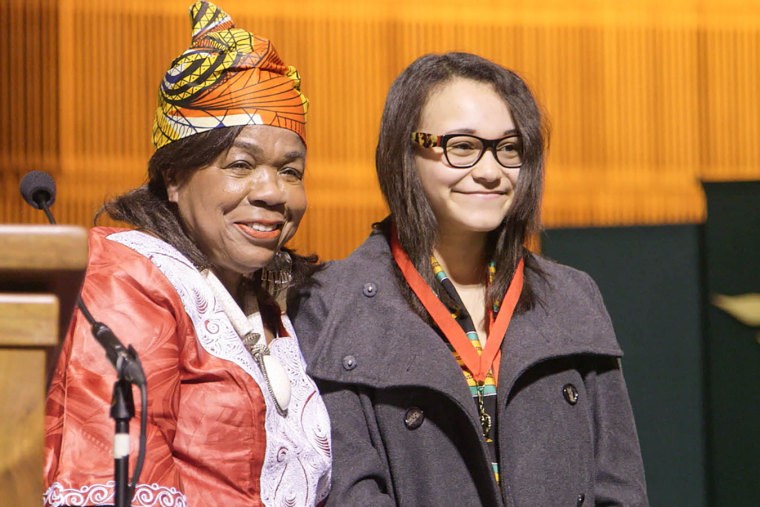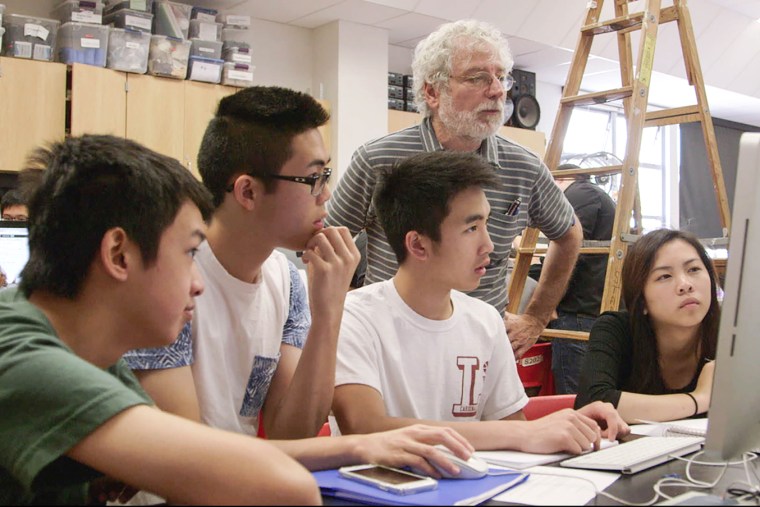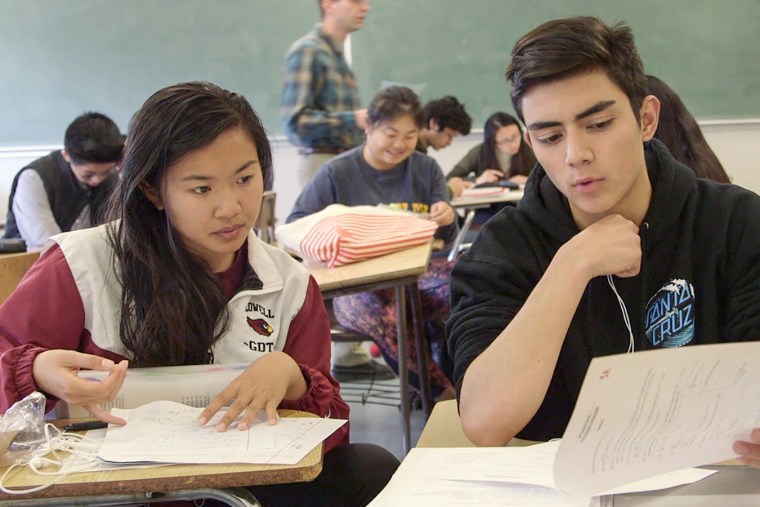Film aims to humanize working-class Asian Americans with elite college dreams
[ad_1]
In a documentary on San Francisco’s rigorous Lowell Large Faculty, an Asian American college student chastises his mom for saying that his father under no circumstances finished substantial college.
“Don’t say that,” then-senior Alvan Cai claims in Mandarin to his mother, Capri, off-digital camera before talking to the filmmakers. “I really don’t want individuals to think lowly of my dad or anything at all.”
Even though Asian Individuals who try for major-tier faculties are stereotyped as getting from rich, educated family members, the reality much more generally resembles tales like Cai’s: youngsters of operating-class immigrants who grab on to the notion of increased education and learning as a car for steadiness in the U.S.
It’s these pupils whom director Debbie Lum claimed she hoped to humanize in her documentary, “Try More challenging!,” which made its broadcast debut Monday on PBS’s Impartial Lens.
“These are the little ones who simply cannot find the money for to go to private school. Households financial institution on that,” Lum informed NBC Asian The united states. “It is a way for a person who didn’t have access to have a way up in modern society.”

Educators and co-chair of San Francisco African American Honor Roll, with honor college student
Rachael Schmidt in a scene from “Try Tougher!”Courtesy Greenwich Leisure
The documentary, which premiered at Sundance past year, chronicles the life of 5 pupils during the 2016-17 university yr as they embark on a grueling university admissions approach.
For seniors throughout the country, the admissions journey could colour a part of their superior college practical experience. But for people at Lowell, the city’s major general public university, the documentary reveals how the process just about solitary-handedly defines students’ coming-of-age, thrusting them into the ebbs and flows of anticipation and heartbreak.
The learners are observed shouldering the burden of extracurriculars ranging from scholar authorities to science competitions to sports activities, together with various state-of-the-art placement classes, and do the job. On leading of it all, a lot of say they are in frequent negotiation in between their personal goals and people of their mother and father. Lum mentioned that with its demanding natural environment, Lowell is frequently described as “elite.” But the phrase comes with socioeconomic baggage that does not fairly properly reflect Lowell learners.
“For the most component, and traditionally speaking, it’s the children who are coming from Chinatown, using an hour bus ride to get there,” Lum mentioned. “Maybe they’re living in Chinatown SRO [single-room occupancy] housing.”

In accordance to the most modern Lowell Significant College Accountability Report Card, launched by the San Francisco Unified Faculty District, the university student inhabitants is overwhelmingly made up of people today of shade, with Asian Individuals constituting extra than 50 %. Additional than a 3rd of the pupil overall body is regarded “socioeconomically deprived.” And around a quarter qualify for totally free lunch.
Lum said it was evident that numerous of the parents, who’re typically Asian immigrants, played no modest element in their children’s instruction, prodding them toward specified endeavors and carting them close to to right after-school pursuits.
But considerably of their involvement, Lum said, appeared to be driven by a belief in the American Dream and a believe in in meritocracy. The mentality is not precise to Lowell, both, but 1 which is frequently misinterpreted and labeled as a symptom of overbearing “tiger parenting.”
Pawan Dhingra, a sociologist and a professor of American studies at Amherst College, earlier explained that the craving to attend elite faculties is rooted in the perception that schooling is the only way for Asian American little ones to compete with others, specially whites. The the greater part of Asian Americans come from immigrant households and do not have present social connections to enable safe work opportunities or internships.
Lum said these family members values spawn a exclusive culture among students, who are bound by a shared knowledge that their dedication on your own could most likely raise them, and their households, up into greater circumstances.
“There is the sort of group where they are all in it jointly and no one has a unique move,” Lum explained. “There aren’t students who, their parents are sitting down on the board of anything or other.”

The director claimed that this atmosphere resulted in a social hierarchy that highly values academic achievement and talent, aspects core to admissions. Social lifestyle, contrary to quite a few other universities, does not orbit all over the jocks. Jonathan Chu, for example, is witnessed as a “Lowell God.” in the film. He excels in his AP classes, masters the violin and many sporting activities, and serves as scholar body president.
Lum stated she uncovered in filming that Chu was also an exceptional piano participant and rumored to ice skate as perfectly. Those in the movie just about lionize him, speaking about Chu as if he were being a mythical icon, for whom they have good admiration. And of course, he’s been recognized to Harvard.
The emphasis on excellence is so pervasive in their social circles, Lum mentioned, that a single scholar, Ian Wang, applied a lot more strain on himself irrespective of energetic encouragement from his mother and father, who are Lowell alums, to get a much less intensive system load.
“Ian employed to get so a lot flak, simply because he only took two AP lessons in his junior yr,” Lum remembers. “We had presently viewed the youngsters supplying him a seriously tricky time about what his mother felt truly lousy about … she was like, ‘I do not want you to destroy by yourself.’”
As admission to elite schools occupy the centre of lifestyle at Lowell, affirmative motion continues to be a matter that lurks under the area. In 1 scene, a physics teacher warns students that they could not get into their dream Ivy League faculty, even if they’ve gained a spot, due to the fact his powerpoint slide reads, “You’re Asian!” And in other people, Rachel Schmidt, a Black university student, reveals some of the assumptions and everyday racism directed at her due to the fact of her race.
“Throughout my time at Lowell, I’ve internalized that stereotype that I get a whole lot of factors for the reason that I’m Black. And I consider for a although, I’ve tried using to not possess up to my blackness,” she admits. “I feel I have labored really hard and I think I have the suitable grades.”
Lum stated that the notion that the playing cards are stacked towards Asian students looms substantial. Even Schmidt advised the filmmakers that she does not imagine it is truthful that her Asian peers aren’t having into school, just mainly because of their race. Even so, Lum said that a the vast majority of the Asian pupils keep on to support affirmative action.
“Our group has been pitted towards other minority communities in this weird way, which isn’t authentic,” Lum stated. “Most of the young children that I talked to were being in assistance of affirmative motion. Even if they assumed, ‘Yeah, that could mean it tends to make it more durable for me. but for people today who have expert systemic oppression, There really should be some righting of the wrongs.’”
[ad_2]
Supply website link







